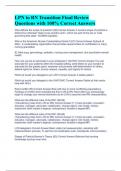LPN to RN Transition Final Review Questions with 100% Correct Answers Who defines the scope of practice? (68) Correct Answer A nurse's scope of practice is defined by individual *state nurse practice acts*, which are part of the law or code governing that state - NCSBN regulates
Who is the American Nurses Credentialing Center? (67) Correct Answer Subunit of ANA - A credentialing organization that provides opportunities for certification in many nursing specialties. IE: Med-surg, gerontology, pediatric, nursing care management, and psychiatric-mental health.
How can you be an advocate in your profession? (247/57) Correct Answer You can advocate for your patients within the hospital setting, write letters to your senator to advocate for the greater good, empower and promote self-determination in others, defend rights for others, ensure respect, equality, and dignity for others.
Which pt would you delegate to an LVN? Correct Answer A stable patient
Which pt would you delegate to the UAP/CNA? Correct Answer Stable pt that needs help with ADLs
Role Conflict (55) Correct Answer Role with two or more conflicting expectations. Feelings of conflict when transitioning from LVN to RN. Most often you unknowingly begin to change your normal behaviors as an LVN to assume new RN characteristics.
What are the different roles of the RN? (56-58)
(Transitioning roles from LVN to RN) Correct Answer (11) Care provider, counselor, educator, manager, advocate, collaborator, change agent, role model, mentor, researcher (with master's degree), entrepreneur (master's degree/NP)
What are the different roles of the RN? (56-58)
(Transitioning roles from LVN to RN) Correct Answer (11) Care provider, counselor, educator, manager, advocate, collaborator, change agent, role model, mentor, researcher (with master's degree), entrepreneur (master's degree/NP)
LVN delegation Correct Answer Basic vitals (not assessments), assisting with implementation process, IV start but not medication push, therapeutic communication
Stages of Patricia Banner's Theory (80) Correct Answer Believed that nursing knowledge accrues over time. *Novice Stage*- Level 1; student nurse or nurse on unfamiliar floor.
*Advanced Beginner Stage*- Level 2; advanced beginner; new grad with acceptable performance.
*Competency Stage*- Level 3; competent, can multi task, plan, and set goals.
*Proficient Stage*- Level 4; proficient nurse; is able to assess situation/pt in a holistic manner.
*Expert Stage*- Level 5; expert; has ability to recognize patterns and responses that are
automatic and integrated.
Levine's Conservation Model (85)
(how would you apply it) Correct Answer Wholeness- Adaptation- adapting to disease process/disability
Conservation- conservation of energy, structural integrity, personal integrity, and social integrity.
Application: Nurse of amputee realizes pt need for changes to adapt to disability; Nurse caring for AIDS pt will plan energy conserving activities balanced with rest
Jean Watson's Theory of Caring Correct Answer -Promotes healing and wholeness
-Places CARE BEFORE CURE
-Emphasizes the nurse-patient relationship
-10 factors: values, faith and hope, compassion for self and others, trusting, rapport, encouraging and accepting emotional expression, analytical decision making, collaborative teaching and learning, supportive environment, and meeting needs
Magnet Hospitals Correct Answer -Recognized by ANCC
-Measure the strength and quality of nursing staff at hospital
-Where nursing delivers excellent patient outcomes, have a high level of job satisfaction, low staff nurse turnover, appropriate grievance resolution
-Indicated nursing involvement in data collection and decision making in patient care
-Value staff nurses
-Effective/Efficient nursing care
PICO (124) Correct Answer *P*t - Pt, population, or problem
*I*ntervention - intervention, use of interest
*C*ompromise- comparision of intervention (if applicable)
*O*utcomes- outcome to be measured
Principle: Four elements used to formulate a good clinical question (in EBP). Allows for systematic method of identifying important concepts when formulating the clinical question.




